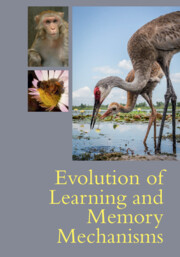Book contents
- Evolution of Learning and Memory Mechanisms
- Evolution of Learning and Memory Mechanisms
- Copyright page
- Contents
- Figures
- Tables
- Contributors
- Preface
- Introduction
- Part I Evolution of Learning Processes
- Part II Evolution of Memory Processes
- 16 The Evolution of Memory as an Immediate Perceptual Identification Mechanism
- 17 Episodic Memory in Animals
- 18 Evolutionary Origins of Complex Cognition
- 19 Evolution of Memory Systems in Animals
- 20 What Laboratory and Field Approaches Bring to Bear for Understanding the Evolution of Ursid Cognition
- 21 Distinguishing Mechanisms of Behavioral Inhibition and Self-control
- 22 Metacognitive Monitoring and Control in Monkeys
- 23 Adaptive Memory
- 24 Remembering Cheaters
- 25 Development of Memory Circuits under Epigenetic Regulation
- 26 Constraints on Learning and Memory
- Index
- References
24 - Remembering Cheaters
The Influence of Social Relevance on Source Memory
from Part II - Evolution of Memory Processes
Published online by Cambridge University Press: 26 May 2022
- Evolution of Learning and Memory Mechanisms
- Evolution of Learning and Memory Mechanisms
- Copyright page
- Contents
- Figures
- Tables
- Contributors
- Preface
- Introduction
- Part I Evolution of Learning Processes
- Part II Evolution of Memory Processes
- 16 The Evolution of Memory as an Immediate Perceptual Identification Mechanism
- 17 Episodic Memory in Animals
- 18 Evolutionary Origins of Complex Cognition
- 19 Evolution of Memory Systems in Animals
- 20 What Laboratory and Field Approaches Bring to Bear for Understanding the Evolution of Ursid Cognition
- 21 Distinguishing Mechanisms of Behavioral Inhibition and Self-control
- 22 Metacognitive Monitoring and Control in Monkeys
- 23 Adaptive Memory
- 24 Remembering Cheaters
- 25 Development of Memory Circuits under Epigenetic Regulation
- 26 Constraints on Learning and Memory
- Index
- References
Summary
A popular assumption in evolutionary psychology claims that reciprocal altruism is supported by a cognitive module that helps individuals to detect and remember cheaters. Enhanced memory for cheaters would be suited to avoid social exchange situations in which we run the risk of getting exploited by others. In line with this idea, previous studies found a source memory advantage for faces of cheaters relative to faces of cooperators. However, such findings should not be interpreted uncritically. This effect can also be explained with more general cognitive mechanisms. A general preference to attend to and remember negative and unexpected information may ensure that our limited processing resources are focused on relevant information. Therefore, enhanced source memory should be found for a variety of situations, proving to be more adaptive than a mechanism exclusively focused on cheating.
Keywords
- Type
- Chapter
- Information
- Evolution of Learning and Memory Mechanisms , pp. 424 - 437Publisher: Cambridge University PressPrint publication year: 2022

